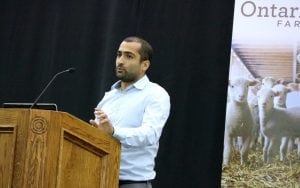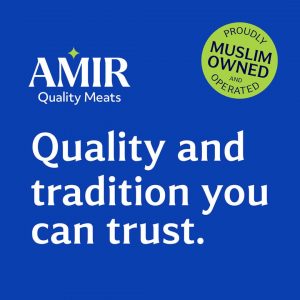
Wahab Zamani’s family knows what it wants in a lamb. And family members go to great lengths, partnering with sheep farmers, to get it.
The Zamani family runs Simcoe Street Meat Packers and processes lamb in Kawartha Lakes for its retail stores in Toronto. They specialize in “truly halal products” he told the Ontario Sheep Convention as part of a panel on marketing lamb.
Zamani, an accountant who studied economics at the University of Guelph, says that working directly with farmers they know and who want to supply top product means a better product for their customers.
“We are consumer centric,” says Zamani. “We figure out what consumers want and then we do everything in our power to get them that. We go to demand and work backwards.”
Their ability to supply what consumers want is aided by building strong relationships with supplying farmers.
He says their success hasn’t been complicated. “Take that really nice product that those consumers want and price them fairly and then your business grows.”
However, market forces push faster and cheaper production, which has meant Zamani, like people who work in most family businesses, has had to pull out the welder and modify equipment and create new processes.
“My dad’s first dozen lamb took him three hours. I wonder how he stayed in business.”
Zamani was asked what made an ideal lamb for him and he had a rapid-fire and detailed response, including dressing at 48 lbs, with a quarter inch, but no more than an inch of fat. The stomach will have less than 1.5 lbs of suet and the lamb will be leaner looking than many of the lambs he seeing. It will be a light pink color and well framed. He encouraged more crossbreds.
“Straight Rideaus and straight Suffolks will not make the cut,” he says.
Bill McCutcheon, a sheep farmer who also coordinates a lamb value chain between producers and processors says Zamani’s numbers are accurate. He says lambs should be 20 to 24 kg warm dressed weight with a GR measurement (a tool used to measure fat) of seven to 15 mm.
McCutcheon was also on the panel, along with sheep farmer Sandi Brock, who was named the Ontario Sheep Farmers Shepherd of the Year.
Brock, who sells her lambs through McCutcheon’s system, says she appreciates hearing from processors, and that one of their farm’s biggest advantages is its relationships.
“Align yourself with people who want to see you succeed,” she says.
Marketing is not her forte, she says, and couldn’t see herself doing direct marketing, but she says she knows that she needs to spend time on the financials and marketing.
“I’d rather be in the barn.”
Zamani says he leaves the farming to the sheep experts, but he will tell them what he wants to see arriving at his plant. How they get the sheep to those specifications is up to the farmer.
For example, he appreciates receiving sheared or clean lambs to minimize potential for E.coli contamination.
“Keeping those lambs clean is very important and it starts on the farm. In order to put out a really safe product, we need clean animals,” he says.
Unfortunately, the areas that are often most dirty on a lamb are also where processors need to cut into the animal, including the back and down the back legs and the area from the neck to the belly.
A producer who gets different definitions of halal from different buyers asked Zamani to define the term for her. Halal is a Muslim standard for meat production.
“The discussion could last for hours on what is Halal,” says Zamani. “Not all Muslims are the same. What it means to us is that the animal is treated in the most humane, respectable way possible.”
Zamani has a window into their kill floor for customers to watch.
“If they don’t appreciate it or like how we’re doing it, they can go elsewhere,” he says.
The focus for Zamani always comes back to the customer.
“The difference is that a really good lamb brings back customers and a poor lamb doesn’t.”



